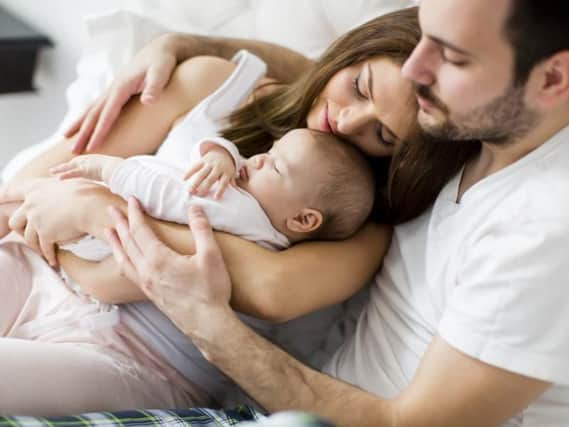Just a Baby app connects people wanting to conceive


Just a Baby - which is launching in the UK this week - allows people looking for an egg or sperm donor to match with people of the opposite sex to create a baby.
Aimed at singles, same sex couples, those with fertility issues and other people in non-traditional circumstances, the app allows people to swipe left and right to decide if people seem like potential matches to be a father or mother to their baby.
Advertisement
Hide AdAdvertisement
Hide AdUsers create a profile detailing who they are, where they are from and what exactly they are looking for - then allows them to view profiles of potential sperm donors, egg donors, co-parents, partners and surrogates.
People who connect on the app - which is free to download and was launched in Australia earlier this year - then need to engage with legal and family counselling, and fertility services, prior to conception.
The app also suggests that people who meet via the app may even opt for the more “traditional” route to conception.
“We can match you with other people who want to make babies, in both traditional and not-so-traditional ways,” says the app information on the Google Play store.
The app’s creators, Paul Ryan and Gerard Edwards, said that the system - which like Tinder or Grindr, deems people to be a “match” if they have both swiped right - avoids people having to rely on an anonymous donor or an old friend to co-parent their child.
Mr Ryan said: “Friendships change when children become involved and the legal fallout of not being properly prepared can be unpredictable. Obtaining support in advance is crucial to getting through the whole process safely, and to be in a position to provide a happy, secure future for your child.
“I could see that the stereotypical millennial lifestyle had diverged from the traditional way of starting a family, and whilst everyone seems happy enough that marriage rates are on the decline, relationships are becoming shorter in length and people are twice as likely to identify as LGBTQ, there was no corresponding social movement to ensure that we could all still have kids in a socially acceptable manner.
He added: “To have a baby, you don’t need a marriage necessarily, that is but one lovely option. There are lots of other lovely options. Ultimately, you need a sperm, an egg and a womb.”
Advertisement
Hide AdAdvertisement
Hide AdHowever, Gwenda Burns, Scottish Branch Coordinator, Fertility Network Scotland said that people need to be supported in their decision to have a baby through a non-conventional route.
She said: “Anyone considering alternative ways of creating a family – egg or sperm donation or surrogacy – needs access to reliable, clear information and practical and emotional support to assist them in making the best decisions for them. We are concerned that such complex help may not be provided fully via an app and that individuals using the app in isolation may not receive the help they need to make such far-reaching decisions.”
According to the Office for National Statistics, there are currently more than 17 million unattached adults in the UK, and more than 15,000 married same-sex couples.”
Users who have downloaded the app online have welcomed the idea.
“Awesome idea, really helping open up opportunities,” said Frank Snagbeater. “The future is weird, and I like it! Bring on the babies,” added Steven Gerard.
"It is a minefield"
Lisa Girdwood, partner in family law at Brodies.
“The problem for any couple trying to have a baby in these circumstances is that there are a number of legal loopholes to make sure they have got rights as parents.
“In Scots law, if you are married at any time between the conception of the child and the birth, you would be presumed to be the father. If a child is conceived in a fertility clinic, through sperm donation and born to a married couple, the husband, not the sperm donor, will be deemed to be the father “for all purposes” if certain conditions are met. The same is true for an unmarried couple if they seek treatment together.
“When you get into the world of surrogacy, it becomes even more complicated. Parents, whether married, civily partnered or living together in an enduring heterosexual or same sex family relationship.will only become “ parents in law “ by applying for a court order following a surrogacy arrangement . An order will only be granted if a number of conditions are met and the parental order is consistent with the welfare of the child. The child must be carried by a woman who is not one of the parties to the application and the child must be related to one of the parties to the relationship.
Advertisement
Hide AdAdvertisement
Hide Ad“What is important is for all parties in this situation to be open and have an ongoing conversation with each other throughout the process.
“It is a minefield and obviously while it may be positive if people are given access to all sorts of ways of conceiving a child that otherwise, they would not have had, the simple message is you need to understand what conditions you need to fulfil to ensure that the child you so long for is truly your child in law.”